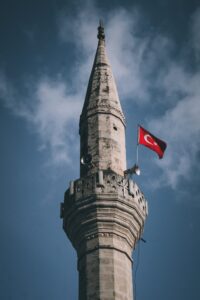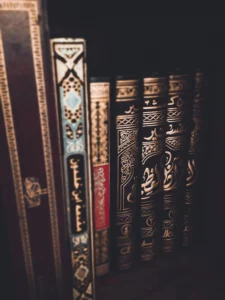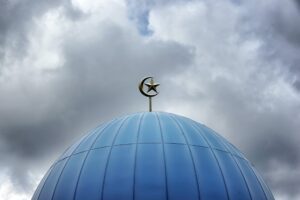Ummatics Colloquium
Palestine: The Premier Ummatic Cause
Summary
Our October 2023 colloquium focused on the agency of the Muslim public in shaping public opinion, specifically in relation to the ongoing bombardment of Gaza. The event was moderated by Usaama al-Azami and paneled by Dr. Ramzy Baroud, Sami Hamdi, and Laila Al-Arian.
Dr. Ramzy Baroud, Editor-in-Chief of The Palestine Chronicle, addressed the reasons Palestine assumes great importance in global Muslim consciousness as well as the history of global Muslim involvement with the Palestinian cause.
Laila Al-Arian, an Emmy-award-winning broadcast journalist, tracked both the presence and absence of the Ummatic perspective in media coverage and social media activity on the current war.
Finally, Sami Hamdi, Managing Director at the International Interest, shared his analysis of the potentialities of the current Muslim public opinion pressure.
Dr. Baroud started by discussing how the everyday Muslim perceives Palestine and how their spiritual frame of reference and background influence their relationship with the Palestinian cause. He argued that when we talk about Al-Aqsa, we are necessarily talking about something that is larger than just the land itself. It is not only about the mosque but also its surroundings and the history that gives them importance. Muslims, Dr. Baroud claims, are attached to Palestine because of a fundamental spiritual and religious framework.
Adding to this, he also mentioned two important experiences in the collective Muslim memory about Palestine: the history of the crusades and the history of modern colonialism. Both shape how we think about and respond to the current realities in Palestine.
Dr. Baroud also talked about the erasure of the category of the Palestinian in contemporary Israeli discourse as part of a program to erase Muslim claims to the cause, something we must recognize and reject. At the same time, he also emphasized that the Palestinian cause is not a “holy war” and should not be seen as such. Mentioning the fact that U.S. politicians such as Lindsay Graham have used such terms, he notes that Palestinians do not think in these terms and that neither should the Umma.
Responding to Dr. Baroud, Dr. al-Azami asked two questions, one about the diaspora and what it can do to help the Palestinians, and another about what the future holds for Palestine and what Islamic solidarity can do for the cause.
Dr. Baroud said that while many today wish to shed the Islamic character of the Palestinian cause, this is a mistake and reflects colonial thinking. He said that if we adopt this sort of thinking, we are preventing ourselves from tapping into a global solidarity movement. Furthermore, it is important to note that calling Palestine an Islamic cause does not mean it is an exclusively Islamic cause.
Following Dr. Baroud, Laila Al-Arian began by addressing global solidarity with Palestine, which she argued is a testament to the just nature of the cause. Al-Arian said that the callousness of the political establishment speaks to the dehumanization of the Palestinians and explains why support for Israel is so strong in certain circles. She said we need to talk about what the situation in Palestine is truly about but also what it isn’t about. It is not a holy war, and it is not a land without a people for a people without a land. It is genocide, ethnic cleansing, and a settler-colonial project.
She added that there are many complicit in what is happening in Palestine, not just politicians, but also Muslim American leaders. Speaking out about these figures and programs is important despite the backlash that might come with doing so.
Al-Arian noted that, today, if you put Palestine on the chopping block, political benefits come with it. This is why Muslim American leaders have often done so. But we need to stand up against this as much as we stand up against fabricated stories about what is happening in Palestine. Standing up for truth is important, and standing up against the Israeli propaganda machine is important too. This means debunking unverified claims by the media as well as U.S. intelligence services and even the President himself.
Al-Arian also said we need to think about why Israeli violence is described in clinical, detached terms, while the same is not true of Palestinian violence, and about what does and does not get covered in Western media about Palestine, including what language gets used to describe the events in Palestine. It is not just incumbent on us as Muslims to be clear about what is happening in Palestine and to speak the truth about it, not only because we are Muslims but also because our tax dollars and our government are involved in what is currently unfolding.
She concluded by stating that we cannot shield ourselves from the unfolding realities, despite the trauma and challenges that come with being informed, and we should not feel intimidated about speaking out.
Following Laila, Sami Hamdi spoke about the Umma’s approach to what is happening in Palestine. He argued that the reason it is an Islamic cause is that there is an impulse within Islam and among Muslims to reject settler-colonialism as a project and all that it stands for. It is not just about the holy sites in Palestine but also about the injustice of what is happening to the Palestinians. The simplicity of the cause is very attractive to Muslims and speaks to their basic moral commitments and understanding of justice.
Hamdi also mentioned that we as Muslims need to think critically about the solutions being offered to the Palestinians by their oppressors. Often, the way we see leaders talking about a two-state solution is simply a way to legalize an enduring situation of injustice.
Hamdi continued by discussing one of the great shifts we have seen in recent times, which is that Israel is losing its monopoly over the narrative on Palestine, and it is losing it precisely because of a new generation of Palestinians who are confronting it and the Umma who has been instrumental in amplifying the Palestinian narrative online. The consequences of this shift are palpable and it is shifting global opinion on Palestine and working to combat fake narratives that Israelis and their supporters are attempting to spread.
Just as Palestinians are giving Muslims hope, Muslim responses are also giving Palestinians hope. It is therefore important to continue the online pressure and to keep talking about Palestine in public. In this way, Israel can no longer control public opinion and it will never be able to regain control over it.
Hamdi finished his talk by mentioning that while we may be sad watching what is happening in Palestine, it is important to remember that in the bigger picture this is a turning point and the international community is moving in a new direction.
Discussion
Following the three talks, the floor opened up for questions and answers, moderated by Dr. al-Azami.
The first question was about the importance of public opinion and whether we might be overstating it given the clear opposition, for example, to the Iraq war but the inability of that opposition to achieve anything positive.
In response to this question, Sami Hamdi said that while he understands that sentiment, the aggressive response by Israeli officials and their supporters to regulate public opinion speaks to its power and importance in the struggle for Palestine. He added that our view about the ineffectiveness of public opinion is challenged by the sincere belief of the Israelis that it is one of the most important factors in the ongoing conflict. We must therefore understand that public opinion should not be underestimated and it is a formidable force in war.
The second question asked was about what we can do to humanize Palestinians and to have a greater impact on those who have influence.
Laila Al-Arian responded to this question by saying we need to make our voices heard about problematic coverage on Palestine, which also requires us to have media literacy. Dehumanizing language can be combatted by holding people to account, speaking truth, and expressing our frustrations through on-the-ground work.
The third question was about the Israel lobby and how Muslims can combat it, but also how Muslims can create their own productive counter-efforts.
Sami Hamdi responded by saying that part of this is accomplished by what he said earlier about public opinion and our need to influence it. We have to be creative but also we have to recognize that lobbying efforts are already happening, especially in the media, and this feeds into the political realities we are trying to change. Our social media response shows the world that we have the capacity for lobbying and we have the power to engender change.
The fourth question was about the Boycott, Divestment, and Sanctions movement (BDS) and the extent of its influence.
Laila Al-Arian responded by saying that BDS was important in the South African struggle, and if it weren’t effective we wouldn’t see so many efforts in the U.S. to pass legislation banning or criminalizing BDS. It is therefore one of the most important non-violent forms of resistance to the ongoing Israeli occupation and apartheid.
The final question was about how young people should respond to our politicians on Palestine.
Sami Hamdi responded by saying we need to raise our voices and insist to them that it matters to us without fear of backlash. Young people are already doing a lot and they are shifting how our algorithms on social media operate on the issue of Palestine. We now have an environment where we can speak openly about Palestine and we should take advantage of that fact. The global shift in Palestine sentiment means we need to keep up the pressure and make our political representatives feel that we are an important constituency.



